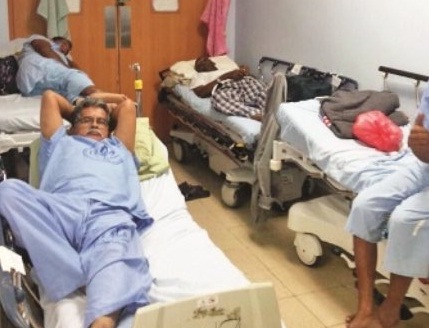Poor oversight in cases of medical malpractice

Noticias Relacionadas
Medical malpractices in Panamanian hospitals are coming to light more and more often. The issue has been an increasing source of concern among common citizens, who feel impotent as their complaints to the authorities often go unheard. Such is the outrage at what appears to be the impunity of those responsible, that some citizens have teamed up to form associations of victims of malpractice. The Chocolate Ribbon group is one such association that was founded to honor the death of Panamanian sociologist Raul Lewis. Mr. Lewis passed away on 30th April 2011, having been hospitalized for a simple eye surgery.
More recently, another family lost a dear one who entered hospital for a kidney stone operation and passed away having suffered an infection and multiple cardiac arrests. The relatives felt that had been misinformed about the real conditions of their family member and kept in the dark about the fact that he had suffered major complications. The Social Security Authority (CSS) has launched an investigation into the case.
Lack of oversight
Victims of supposed cases of medical malpractice argue that the root causes of these deaths are multiple. They encompass lack of proper supervision of staff, disregard of appropriate medical protocols and, in the worst of cases, weak vocational principals on the part of the medical staff. In response to this, medical professionals point out that medical cases are complex situations in which more than one factor may be at play: blaming the doctor in question for malpractice may be a simplistic reaction to a complex situation.
According to Alma Montenegro de Fletcher, a former State Attorney for the Administration as well as supporter of the Chocolate Ribbon campaign, at the heart of the problem lie poor values within the medical profession. “Doctors and nurses should be first and foremost preoccupied with the well-being of their patients, via a correct diagnosis: that is their primary moral obligation, it should be their key vocation on a daily basis”, she explained. Mrs. Montenegro de Fletcher went on to say that, though malpractice may not necessarily be intentional, strict supervision is required to make sure it does not result out of simple carelessness on the part of medical staff.
Juan Jovane, an economist and former director of the CSS, equally emphasizes the importance of ensuring that medical protocols are crystal clear, and adhered to in a disciplined manner. For that purpose, Mr. Jovane highlighted the importance of carrying out regular audits to monitor compliance with the prevailing guidelines.
Unsurprisingly, medical practitioners tend to disagree with this view. Domingo Moreno, a doctor, was keen to remind that malpractice, even when present, is very hard to prove. “Generally, it is not just down to a single doctor intentionally meaning to do harm: there are various players involved across the board”, he explained. Mr. Moreno went on to add that when a doctor is singled out for malpractice, it is never a “simple case of apportioning responsibility”, as there are generally many other players involved in a complex chain of responsibilities. In this sense, the College of Physicians has an important role to play via its ethics committee, where issues of this nature should be brought to an examined in the broad light of day.
Fernando Cebamanos, another doctor, echoes the view that malpractice cases are generally complex and, in more than one case, can even be caused by “the simple lack of proper medical equipment and the appropriate medication”. Work overload for medical staff is a further factor that can lead to a doctor making the wrong decisions. “The argument that doctors see patients as objects is a simplistic one”, he admonished.









Para comentar debes registrarte y completar los datos generales.